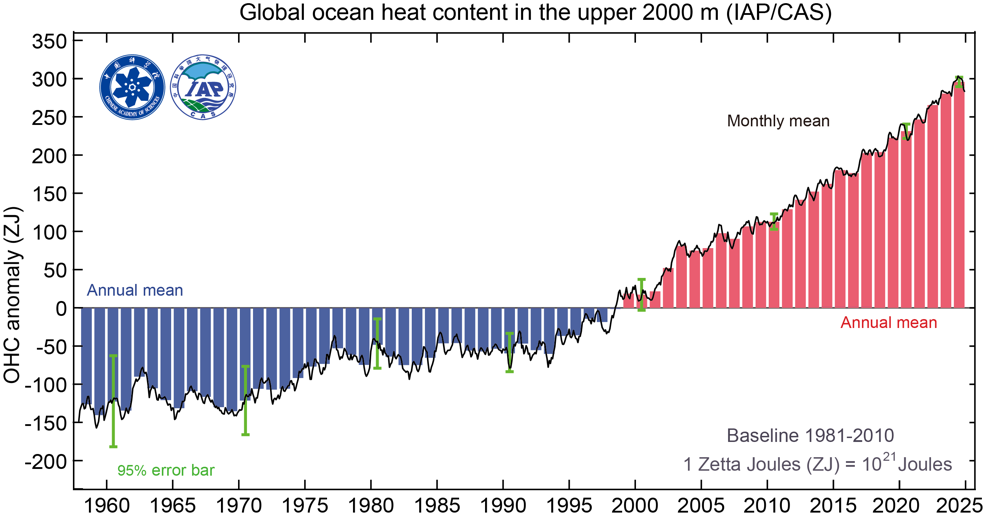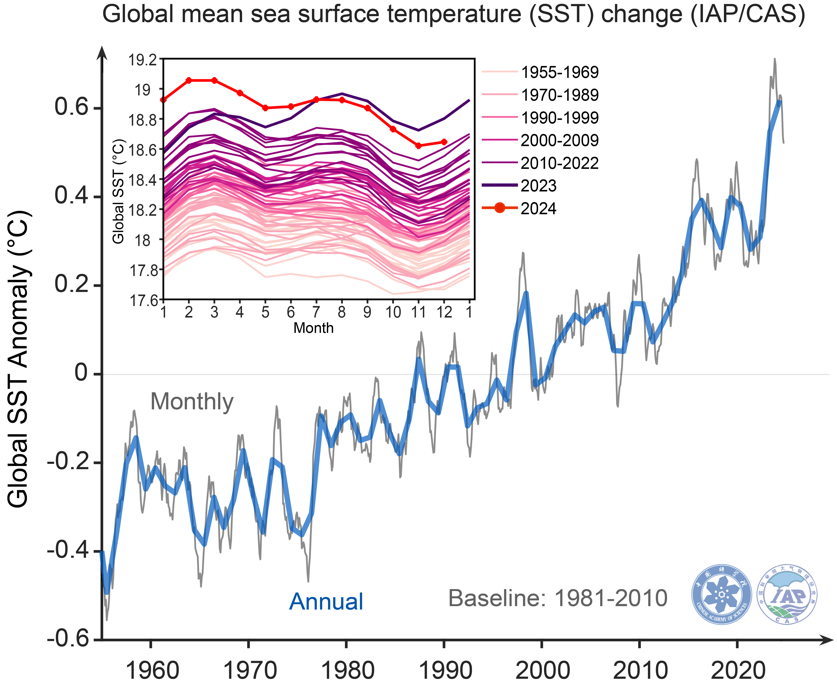Record High Temperatures in the Ocean in 2024
Published in Advances in Atmospheric Sciences, 2025
A new study published in Advances in Atmospheric Sciences has found that ocean warming in 2024 has led to new record high temperatures. The ocean is the hottest it has ever been recorded by humans, not only at the surface temperature but also for the upper 2000 meters.
“The broken records in the ocean have become a broken record.” Said Prof. CHENG Lijing with the Institute of Atmospheric Physics at the Chinese Academy of Sciences. He led a team of 54 scientists from 7 countries and discussed how a hotter ocean affects our lives on land and what this means for our future.
The ocean is a critical part of the Earth’s climate – most of the excess heat from global warming is stored in the ocean (90%) and the ocean covers 70% of the Earth’s surface. Because of this, the ocean dictates our weather patterns by transferring heat and moisture into the atmosphere. The ocean also controls how fast climate change happens.
“To know what is happening to the climate, the answer is in the ocean.” Said Prof. John Abraham at the University of St. Thomas, coauthor of the study.
Results from three international teams who collaborated on this project were consistent – the ocean is warming, and 2024 was a record.

From 2023 to 2024, the global upper 2000 m ocean heat content increase is 16 zettajoules (1021 Joules), ~140 times the world’s total electricity generation in 2023.
“OHC has increased steadily by 15~20 ZJ over the past five years despite the La Niña and El Niño cycles.” Said Prof. Michael Mann from University of Pennsylvania.
The ocean surface temperature is also setting records. The surface temperature refers to temperatures just at the surface, where the ocean waters and atmosphere commute. Surface temperatures are important because they dictate how fast heat and moisture (humidity) can transfer from the ocean to the air and thus affect weather. The rise in surface temperatures since the late 1950s has been staggering.
The changes are not uniform; regional variations can be substantial. The Atlantic is warming along with the Mediterranean Sea, and across the mid-latitude Southern Ocean. While parts of the Northern Pacific Ocean have warmed very rapidly, other areas (the tropical region) have not, mostly due to the La Nina/El Nino cycle in that area. The heat has even accumulated near both the North and South Poles.
A warmer ocean affects marine life and result in huge damage in many ways.
“The main way the ocean continues to influence the climate is through accompanying increases in water vapor in the atmosphere that leads to the damaging increases in extremes in the hydrological cycle. Water vapor is also a powerful greenhouse gas and increased heating leads to drying and risk of drought and wildfire. But it also fuels storms of all sorts and leads to risk of flooding. That includes hurricanes and typhoons.” Said Dr. Kevin Trenberth, a senior scientist at National Center for Atmospheric Research, USA, another member of the team.
For example, over the past 12 months, a staggering 104 countries have recorded their hottest temperatures ever. Droughts, heat waves, floods, and wildfires have impacted Africa, Southern Asia, the Philippines, Brazil, Europe, the USA, Chile, and the Great Barrier Reef, as just but a few examples. Since 1980 for example, climate disasters have cost the USA nearly $3 trillion.
The heat in the ocean is the best measurement for monitoring the changing climate. “The ocean is our sentinel for planetary warming, acting as the major sink of surplus heat accumulating in Earth climate system as a result of anthropogenic emissions” said Dr. Karina von Schuckmann at Mercator Ocean International, coauthor of the study. If there continues to be a failure to take action to slow climate change, the disruption, unprecedented change and its implications, costs and loss and damages will continue to increase.
【Chinese Version中文版】
链接:https://iap.cas.cn/gb/xwdt/kyjz/202501/t20250110_7516495.html
1月10日,由中国科学院大气物理研究所(以下简称大气所)牵头,联合国家海洋环境预报中心、自然资源部第二海洋研究所、中国科学院海洋研究所、中国科学院计算机网络信息中心、美国国家海洋和大气管理局、美国国家大气研究中心、法国墨卡托海洋国际研究所、意大利国立地球物理与火山学研究所等全球31个研究单位的54位科学家组成的国际研究团队,在《ADVANCES IN ATMOSPHERIC SCIENCES》(AAS)发布了2024年全球海温变化研究报告。报告揭示了2024年全球海表平均温度、海洋上层2000米热含量再一次达到了人类有观测记录以来的最高值。海洋逐年不断刷新变暖纪录,这一现象已然成为了一种新常态。
由于人类活动造成的大气温室气体浓度持续增加,海洋正在加速变暖。来自不同研究机构的数据产品一致表明,2024年海洋上层2000米海洋热含量再次达到历史新高。2024年海洋上层2000米海洋热含量比2023年增加了16 ± 8 ZJ(1 ZJ = 10的21次方焦耳)(大气所数据)、18 ± 7 ZJ(意大利国家研究委员会海洋科学研究所数据)。以2023年中国社会的总用电量为基准,如果将16 ZJ的热量完全转换为电能,其能量储备足以支撑全中国社会的用电需求约450年之久。
除此之外,海洋表面温度也在破纪录。海洋表面温度指的是海洋与大气接触处的温度,是海气相互作用的关键变量,能够影响较大范围的天气与气候。2024年全球平均海表温度比2023年高0.07℃(大气所数据)、0.05℃(美国海洋和大气管理局数据)、0.06℃(欧洲哥白尼海洋监测中心数据),创造了现代有观测记录以来的新高(图1)。

但是,海洋的加速变暖和热量的累积并非全球均匀分布,其地区差异非常显著。报告分析了海洋变暖过程的区域特征,发现2024年,印度洋、热带大西洋、北大西洋、地中海、北太平洋、南大洋等区域海洋热含量均创下历史新高,显示了全球海洋大规模增暖的新特点。热带地区、西北太平洋、印度尼西亚贯穿流等海区海温变化波动较大,主要受到厄尔尼诺-南方涛动、太平洋年代际涛动等现象的调控。
海洋物理环境的显著变化已经严重威胁了海洋生态环境与人类可持续发展。2024年,全球有104个国家记录了有史以来最高的温度,多地经历了极端天气事件:大范围的干旱、热浪、野火,影响了南非、南亚、菲律宾、巴西、欧洲及美国东北部。2024年3月份,澳大利亚大堡礁发生了大规模的珊瑚白化事件;而7月加勒比海地区、9月的美国东南部及中国海南地区,先后遭受了多次超强台风(飓风)的袭击。10月底,西班牙遭受到了“现代史上西班牙最严重的洪涝灾害”的袭击,短短几小时内,河流泛滥成灾,造成了至少223人丧生。海洋持续变暖会降低海水中的溶解氧含量,影响海洋生态系统稳定性,进一步影响人类开发利用海洋渔业资源。海洋是台风、飓风等极端天气的能量来源,更暖的海洋也将导致未来台风更强、降水更多,给登陆地造成经济和社会损失:2024年9月超强台风“摩羯”登陆海南,造成了约800亿元的直接经济损失。这些极端气候事件背后都有着地球系统增暖的推波助澜。
该研究同时发布了4个国际机构的2024年海洋数据,分别是来自中国科学院大气物理研究所的海温数据、意大利国家研究委员会海洋科学研究所的再分析数据、欧洲哥白尼海洋监测中心的海温数据、美国海洋和大气管理局的海温数据。大气所海温数据使用了自然资源部第二海洋研究所Argo野外站提供的经质量再控制的全球实时Argo数据集。
论文作者团队包括中国科学院大气物理研究所成里京(通讯作者)、朱江、杜娟、郑飞、V. Gouretski、潘玉莹、谭哲韬、朱雨静、魏旺栩;美国圣-托马斯大学J. Abraham;美国大气研究中心、新西兰奥克兰大学K. Trenberth和J. Fasullo;美国宾州大学M. Mann;美国国家海洋和大气管理局国家环境信息中心团队T. Boyer、R. Locarnini、A. Mishonov、J. Reagan、Huai-Min ZHANG、Boyin HUANG;印度尼西亚国家研究与创新署气候与大气研究中心Albertus SULAIMAN;中国科学院海洋研究所王凡、李元龙、张斌、任秋萍;国家海洋环境预报中心于福江、万莉颖、陈幸荣、王大奎、冯立成、刘旭;河海大学宋翔洲;中国科学院计算机网络信息中心原惠峰;国家海洋信息中心刘玉龙;意大利国立地球物理与火山学研究所S. Simoncelli、F. Reseghetti;中国科学院南海海洋研究所陈更新、张荣望;法国墨卡托海洋国际机构Karina von Schuckmann、Flora GUES;北卡罗来纳州立大学Garrett GRAHAM;生态环境部珠江流域南海海域生态环境监督管理局李冠城;英国欧洲中长期天气预报中心Michael MAYER;国家气象信息中心曹丽娟;自然资源部第二海洋研究所刘增宏;厦门大学吕柯伟;国防科技大学王辉赞、马占宏、鲍森亮、闫恒乾;可持续发展大数据国际研究中心陆亚洋等。
该研究得到了国家重点研发计划(2023YFF0806500)、中国科学院国际伙伴计划(060GJHZ2024064MI)、中国科学院-意大利研究理事会合作项目、新基石科学基金会、国家重大科技基础设施项目“地球系统数值模拟装置”、美国国家科学基金会(NSF)、美国国家航空航天局(NASA)项目、美国国家海洋和大气管理局(NOAA)项目等的支持。本研究中相关计算使用中国科学院计算机网络信息中心与大气物理研究所共同研发的海洋观测数据处理软件包,并在国产“东方”超级计算系统上完成;相关观测数据的收集整编得到中国科学院海洋科学数据中心的支持。
Citations: Cheng L. J. Abraham, K. E. Trenberth, J. Reagan, H.-M. Zhang, A. Storto, K. von Schuckmann, Y. Pan, Y. Zhu, M. E. Mann, J. Zhu, F. Wang, F. Yu, R. Locarnini, J. Fasullo, B. Huang, G. Graham, X. Yin, V. Gouretski, F. Zheng, Y. Li, B. Zhang, L. Wan, X. Chen, D. Wang, L. Feng, X. Song, Y. Liu, F. Reseghetti, S. Simoncelli, G. Chen, R. Zhang, A. Mishonov, Z. Tan, W. Wei, H. Yuan, G. Li, Q. Ren, L. Cao, Y. Lu, J. Du, K. Lyu, A. Sulaiman, M. Mayer, H. Wang, Z. Ma, S. Bao, H. Yan, Z. Liu, C. Yang, X. Liu, Z. Hausfather, T. Szekely, F. Gues: 2025: Record High Temperatures in the Ocean in 2024. Advances in Atmospheric Sciences, https://doi.org/10.1007/s00376-025-4541-3
Recommended citation: Cheng L. J. Abraham, K. E. Trenberth, J. Reagan, H.-M. Zhang, A. Storto, K. von Schuckmann, Y. Pan, Y. Zhu, M. E. Mann, J. Zhu, F. Wang, F. Yu, R. Locarnini, J. Fasullo, B. Huang, G. Graham, X. Yin, V. Gouretski, F. Zheng, Y. Li, B. Zhang, L. Wan, X. Chen, D. Wang, L. Feng, X. Song, Y. Liu, F. Reseghetti, S. Simoncelli, G. Chen, R. Zhang, A. Mishonov, Z. Tan, W. Wei, H. Yuan, G. Li, Q. Ren, L. Cao, Y. Lu, J. Du, K. Lyu, A. Sulaiman, M. Mayer, H. Wang, Z. Ma, S. Bao, H. Yan, Z. Liu, C. Yang, X. Liu, Z. Hausfather, T. Szekely, F. Gues: 2025: Record High Temperatures in the Ocean in 2024. Advances in Atmospheric Sciences
Download Paper
